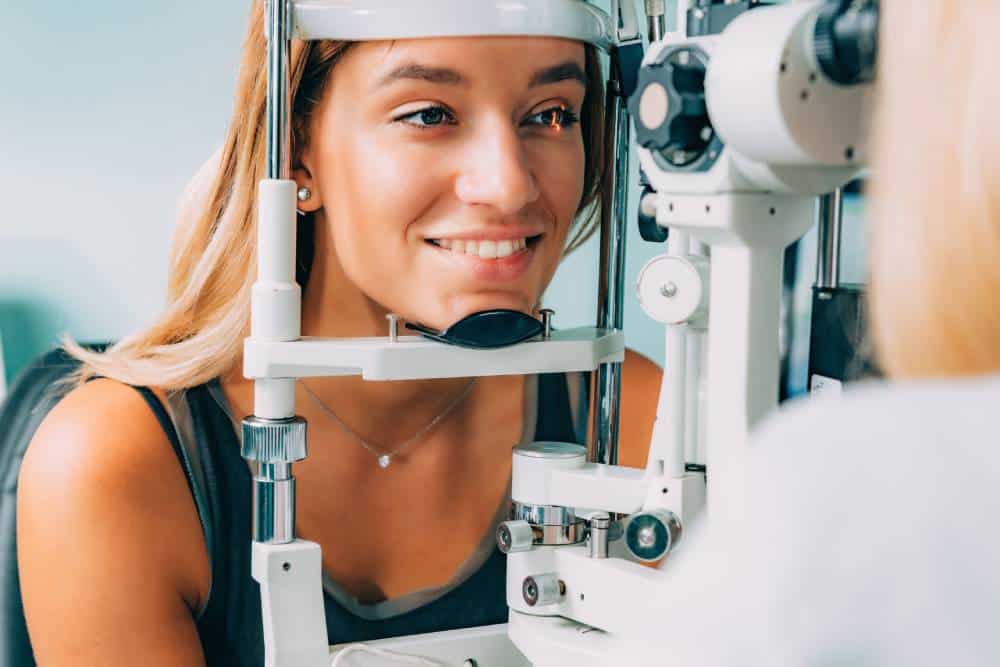General ophthalmology and regular eye exams are an overlooked yet crucial part of maintaining one's overall health. At the Keamy Eye & Laser Centre, Dr. Jean E. Keamy offers the latest general ophthalmology services to patients in Salem, Westborough, Boston, and the surrounding areas of Massachusetts. Call 508.836.8733 today to schedule a consultation with Dr. Keamy!
Eye Exam Benefits
Regular eye exams are an invaluable tool in maintaining eye health by detecting and preventing disease.
Some diseases, such as glaucoma, develop gradually without causing pain or vision loss, so patients may not notice that anything is wrong until significant and irreversible damage has been done.

Early detection of eye diseases can allow for a choice of treatment options and reduced risk of permanent damage.
Patient Testimonial
Read what our patients are saying!
"I’ve been a patient of Dr. Keamy for about 5 years. Each time I go in for a check-up or to get my prescription refilled, Dr. Keamy and the staff are always very welcoming and nice to me. Dr. Keamy takes her time and explains what she is doing and why during my check-ups — great care and she educates me. I highly recommended Dr. Keamy for all ages."
How often do I need an eye exam?
Patients should see their doctor for a comprehensive eye exam every one to three years, depending on their age, risk of disease and overall physical condition. Children should have regular tests to ensure the proper development of their vision and prevent any interference with their academic achievements. Even if your eyes are healthy, you should still have a regular eye exam to detect any problems as soon as possible and begin necessary treatment.

What can I expect from an eye exam?
During a routine eye exam, your doctor will evaluate your eyes for refractive errors, as well as common conditions such as:
- Amblyopia
- Strabismus
- Presbyopia
- Glaucoma
- Diabetic eye disease
This is done through a series of eye tests that examine all aspects of the eye, including a visual field test, dilation, glaucoma test, slit-lamp examination, cover test, retinoscopy and refraction. These tests can all be performed in your doctor’s office and are safe for all patients.
What is Blepharitis?
Blepharitis is the chronic inflammation of the eyelid and eyelash follicles. It is not contagious and affects patients of all ages. Blepharitis presents as red, swollen eyes and crusty, flakey eyelids.
Blepharitis Treatment
There is alleviation, but no cure, for Blepharitis. Warm compresses provide relief and loosen the crust along the lash line. Gently washing the eyelid and eyelashes with mild soap and water will keep the area clean and the Blepharitis at bay. If there is a bacterial infection, an antibiotic along with the cleansing regime usually clears up or lessens the symptoms of Blepharitis.
Blepharitis: Overview
Lid Hygiene: Warm Compress
Chalazion: Overview
Dry Eye Treatment
Dry eye is a common condition that occurs when the eyes are insufficiently moisturized, leading to itching, redness and pain from dry spots on the surface of the eye. The eyes may become dry and irritated because the tear ducts don’t produce enough tears, or because of a chemical imbalance in the tears.

Floaters and Flashes
Floaters and flashes of the eye commonly occur as the result of age-related changes to the vitreous gel. The vitreous is firmly attached to the retina and is a thick, firm substance without much movement. As we age, the vitreous becomes thinner and more watery, and tissue debris that was once secure in the firm vitreous gel is now able to move around on the inside the eye, casting shadows on the retina.
What is diabetic retinopathy?
Diabetic retinopathy is a complication of diabetes. The length of time a patient has diabetes will determine the likelihood of developing diabetic retinopathy. Over 40 percent of patients in the United States, diagnosed with diabetes, have a form of diabetic retinopathy. Diabetic retinopathy is the most common diabetic eye complication and a leading cause of blindness in American adults. Diabetic retinopathy causes the blood vessels that supply nourishment to the retina, the light-sensitive lining in the back of the eye where vision is focused, to weaken. These weakened vessels can leak, swell or develop thin branches, causing a loss of vision.
During any stage of diabetic retinopathy a condition known as macular edema can develop. Macular edema is the buildup of fluid in the macula, the light-sensitive part of the retina that allows us to see objects with great detail. As the macula swells vision becomes blurred. About half of the people with proliferative retinopathy are diagnosed with macular edema.
Diabetes: Overview
Diabetic Retinopathy: Overview
Diabetic Retinopathy: PDR
Diabetic Retinopathy: Treatment Overview
Diabetic Retinopathy: Pan Focal Laser
Intravitreal Injections: Overview
What is macular degeneration?
Macular degeneration, also known as age-related macular degeneration (AMD) is a common condition in older adults and the leading cause of vision loss in people over the age of 50. Macular degeneration affects the macula, the part of the retina responsible for the crisp, detailed central vision needed for reading or driving. As we age, the tissue in the eye responsible for vision slowly begins to deteriorate which can significantly affect a patient’s quality of life.
Types of Macular Degeneration
Macular degeneration can be classified as either dry (non-neovascular) or wet (neovascular)
Dry (Non-Neovascular) Macular Degeneration
Dry macular degeneration is the more common diagnosis, and is considered to be an early stage of the disease. This form of the disease usually develops as a result of aging and thinning of macular tissues and the depositing of pigment within the macula.
Wet (Neovascular) Macular Degeneration
Only about 10 percent of patients see their condition progress to the more advanced and damaging wet macular degeneration. In wet macular degeneration, new blood vessels develop beneath the macula and cause a leakage of blood and fluid. This leakage can lead to permanent damage in the central vision and the creation of blind spots.
Macular Degeneration: Introduction
Macular Degeneration: Overview
Macular Degeneration: Treatment Overview
Macular Degeneration: Wet Form
Macular Degeneration: Dry and Wet Treatment Overview
Macular Degeneration: Laser Treatment
Intravitreal Injections: Overview
Macular Degeneration: Dry Form
Macular Degeneration: Prevention Introduction
Nutritional Supplements
Experts disagree on which nutrients can prevent eye disease or reduce vision loss. Studies have been conducted to help us learn more about the relationship between vitamins, minerals, antioxidants and eye health. The general consensus is that the same things that are good for your body are good for your eyes: a healthy diet rich in fruits, vegetables and whole grains, drinking at least six glasses of water a day, regular exercise, and avoidance of cigarette smoke.

Much of the research that has already been conducted points to the benefits of vitamins and antioxidants, specifically beta carotene, vitamins D, E, A and C, zinc, selenium, copper, omega-3 fatty acids, manganese and lutein. The National Eye Institute’s Age-Related Eye Disease Study found that about one-fifth of patients with intermediate and advanced age-related macular degeneration (AMD) were able to reduce their risk of vision loss after taking high levels of zinc and antioxidants. The study did not find a correlation between these nutrients and the development of cataracts.
Patients taking the anticoagulant medication such as warfarin or Coumadin should consult their doctors before increasing the amount of leafy greens they eat.
Optical Services
In addition to the comprehensive ophthalmology services we provide, our practice features a boutique optical shop for convenience of our patients with a wide array of eyeglass frames and contact lenses to suit every look and budget. We provide patients frames from many elite designers such as, Michael Kors, Lacoste, Nine West, DKNY, Easy Clips, offering some of the most fashionable sunglasses and prescription frame styles around.

To learn more about our optical shop, call us today at 508.836.8733 or stop in to see the wide array of products we currently offer.
There is indeed something for everyone to satisfy all ages and tastes.
FAQs
What Is the Difference Between an Ophthalmologist and an Optometrist?
An ophthalmologist is a medical doctor specializing in eye and vision care. They receive training in:
- Performing eye exams
- Diagnosing and treating diseases
- Prescribing medications
- Performing surgeries
Ophthalmologists complete medical school, followed by a residency in ophthalmology. This allows them to address complex eye conditions. They can also perform intricate procedures like cataract surgery, LASIK, and glaucoma treatment.
An optometrist provides primary vision care. This includes:
- Eye exams
- Vision tests
- Prescribing corrective lenses
- Detecting certain eye abnormalities
Optometrists complete a four-year optometry program after their undergraduate studies and earn a Doctor of Optometry (OD) degree. They can manage many common eye problems and prescribe medications for some eye conditions. However, they do not perform surgeries.
Can an Eye Exam Detect Other Health Issues?
Yes, an eye exam can detect several health issues beyond vision problems.
During a comprehensive eye exam, a provider can observe changes in the blood vessels, retina, and optic nerve. Conditions they may detect include:
- Diabetes: Diabetic retinopathy can be diagnosed through changes in retinal blood vessels.
- Hypertension: High blood pressure may damage blood vessels in the retina (hypertensive retinopathy).
- Autoimmune Diseases: Conditions like lupus or multiple sclerosis may present signs in the eyes.
- High Cholesterol: Yellowish deposits around the cornea can point to high cholesterol.
- Thyroid Disease: Thyroid eye disease can cause protruding eyes and other changes visible during an eye exam.
What Are the Risks of Delaying an Eye Exam?
Delaying an eye exam can have several risks, including:
- Worsening Vision Problems: Many eye conditions, like glaucoma and macular degeneration, progress slowly. They can cause significant damage before symptoms appear. Early detection through regular exams can prevent irreversible vision loss.
- Increased Risk of Eye Diseases: Regular exams can detect early signs of eye diseases when they are most treatable.
- Unaddressed Systemic Health Issues: Eye exams can reveal signs of systemic health conditions. Delaying them might mean missing early detection and treatment opportunities for serious health issues like diabetes or hypertension.
- Impact on Daily Life: Uncorrected vision problems can affect your ability to perform daily activities.
What Are the Options for Correcting Refractive Errors Like Myopia or Hyperopia?
Refractive errors like myopia (nearsightedness) and hyperopia (farsightedness) can be corrected through various methods:
- Eyeglasses: This is the most common and non-invasive option. Eyeglasses are tailored to your specific prescription.
- Contact Lenses: Contact lenses offer a convenient alternative to glasses. They provide clear vision without frames.
- LASIK Surgery: This is a popular surgical option. It reshapes the cornea, corrects refractive errors, and offers long-term vision correction.
- PRK (Photorefractive Keratectomy): This surgical option involves reshaping the cornea. It is suitable for those with thin corneas who may not be candidates for LASIK.
Why Choose Keamy Eye & Laser Centre?
Choose Keamy Eye & Laser Centre for exceptional eye care from Dr. Jean Keamy. She is a board-certified ophthalmologist and an esteemed member of the American Academy of Ophthalmology and the American Academy of Cosmetic Surgery.
Dr. Keamy and her team share a commitment to delivering outstanding care in a friendly and supportive environment. Our state-of-the-art facility offers a pleasant and comfortable setting for all your eye health needs.
Call Dr. Keamy For General Ophthalmology In Westborough, MA!
To learn more our general ophthalmology services contact us to schedule a consultation in our Westborough, MA office by calling 508.836.8733. Dr. Keamy and her experienced staff look forward to offering you the latest services and personalized treatments.
Contact us to learn more about General Ophthalmology
